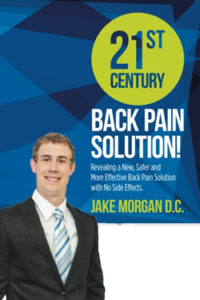 Make An Appointment
Make An Appointment
What Is Causing My Back Pain—Joint, Muscle, or Nerve?
What Is Causing My Back Pain—Joint, Muscle, or Nerve?
Bad things do happen; how I respond to them defines my character and the quality of my life. I can choose to sit in perpetual sadness, immobilized by the gravity of my loss, or I can choose to rise from the pain and treasure the most precious gift I have—life itself.
—Walter Anderson
Joint? Muscle? Nerve? The answer is usually “all of the above.” That is why just addressing one potential source at a time or not addressing the true cause can lead you to frustrations and continued pain, even if you have seen multiple doctors. There is usually a primary source of pain, followed by a second or third dysfunction. The best way to explain a complex problem is with a real-life example:
Susie is a 51-year-old who has worked as an accountant for 22 years. She states that she has sharp lower back pain and occasional numbness in her left leg. She says all she did was bend forward out of her chair to pick up a pen she had dropped on the floor. Now, this motion is not a traumatic event. She probably bends forward to pick objects off the floor several times a day and has so for years. Then what was so different about this one event to cause her back pain? Due to the nature of her lower back, she initially had a muscular imbalance that created improper spinal biomechanics, which over time weakened her spinal supporting musculature. The nerves were slow in sending a message to her muscles to protect or brace her spine as she bent forward. She currently has muscle spasms, misaligned vertebrae, and a disc bulge compressing the nerve that runs down her leg. The primary problem is ligament-stretching or -tearing, causing lack of stability and one or more misaligned vertebrae. Muscle spasms are secondary, and nerve pain is tertiary (third rank). You can now understand that back discomfort is usually a combination of joint, muscle, and nerve problems.
It might be necessary to have medication or injections in instances of severe pain that is irretraceable and limits you physically. Medication should be a means to manage pain while beginning physical treatments or making changes to your muscles, joints, or nerves. Believing the medication is going to solve all of your problems is not accurate, and it can be a dangerous road to becoming dependent on drugs.
Here’s what some of the top medical researchers had to say about chiropractic…
“Manipulation [chiropractic adjustments], with or without exercise, improved symptoms more than medical care did after both 3 and 12 months.”– British Medical Journal
“Chiropractor’s manipulation of the spine was more helpful than any of the following: traction, massage, biofeedback, acupuncture, injection of steroids into the spine and back corsets, and ultrasound.” — Stanley Bigos, MD, Professor of Orthopedic Surgery
For 10 days only, I’m running a very special offer where you can find out how much this amazing treatment can help your pain.
What does this offer include? Everything I normally do in my new patient evaluation.
Here’s what you’ll get…
An in-depth consultation about your health and well-being where I will listen…really listen…to the details of your case. A complete neuromuscular examination, full set of specialized x-rays (if necessary), and a thorough analysis of your exam and x-ray findings so we can start mapping out your plan to being pain free.
You’ll get to see everything first hand and find out if this amazing treatment will be your pain solution, like it has been for so many other patients.
Life is too short to let pain slow you down.
Jake Morgan DC
Call now 325-695-9355
Download your copy of my book or swing by 4549 Catclaw Dr. Abilene,TX and pick up your copy today! 